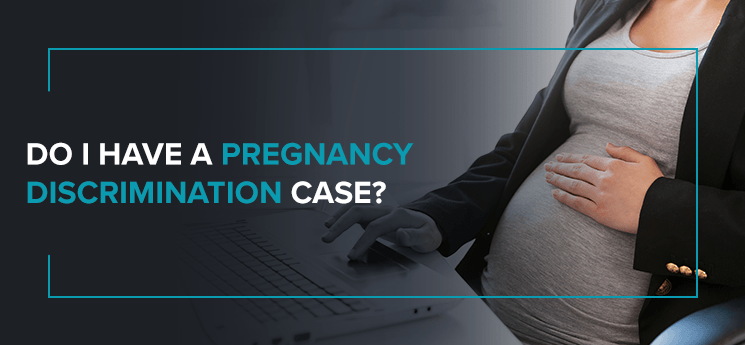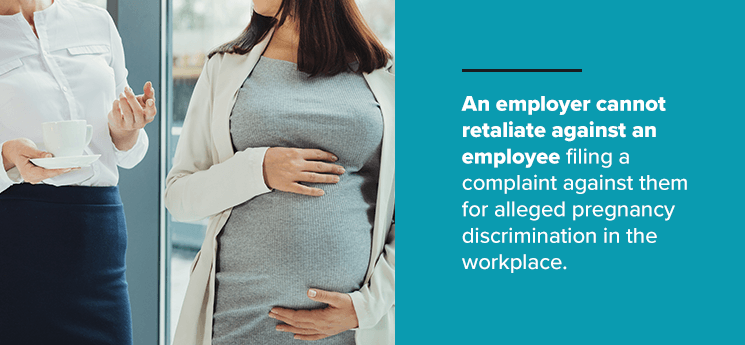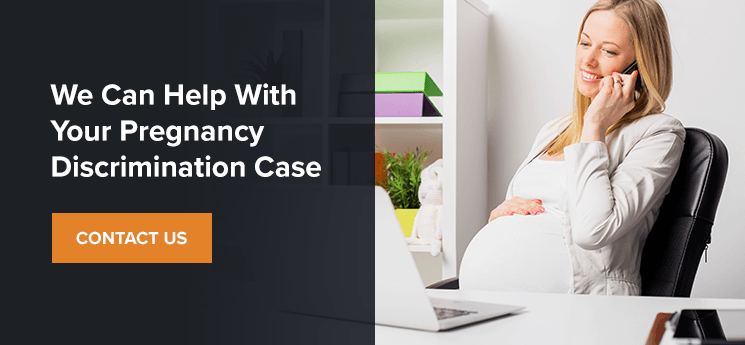Pregnancy is often a joyous and amazing experience for soon-to-be parents. Unfortunately, however, many workers experience discrimination in the workplace because of pregnancy.
If you’ve experienced pregnancy discrimination, you understand how it can affect what is otherwise a beautiful time in your life. Under federal law, you are protected from pregnancy discrimination in the workplace. Learn more if you believe you have experienced pregnancy discrimination and are considering filing a claim with your employer.
What Is Pregnancy Discrimination?
According to the Pregnancy Discrimination Act (PDA) of 1978, employers cannot discriminate against employees on the basis of pregnancy, childbirth or related medical conditions. Pregnancy discrimination can come in many forms, including:
- Demoting pregnant women or women who have just returned after maternity leave.
- Refusing to consider a potential employee due to pregnancy.
- Making inappropriate comments about a woman’s pregnancy.
- Firing a worker because she is pregnant.
- Rejecting a woman for a raise or promotion she is qualified for because she is pregnant.
An employer can ask you if you are pregnant or might become pregnant in a job interview. However, since these questions can be interpreted as having discriminatory intent, the Equal Employment Opportunity Commission (EEOC) recommends employers avoid them.
Employers should treat pregnant employees as they would any other employee with a short-term disability. In general, you cannot be fired, rejected from a promotion, denied a job, forced to take leave or given fewer assignments based on pregnancy. If you can perform the needs of the job while pregnant, your employer cannot legally fire you.
Pregnancy harassment does not always come from your supervisor. The harasser can be male or female, a supervisor from another department, a coworker or even a client or customer.
The EEOC pregnancy discrimination laws do not prohibit discrimination based on parental status, although other laws do. Additionally, the Family and Medical Leave Act (FMLA) provides new parents with up to 12 weeks of unpaid leave each year for the birth and care of a new child.
How the Pregnancy Discrimination Act Protects You
The Pregnancy Discrimination Act protects pregnant women and women who have been pregnant or may become pregnant. The PDA secures your rights by:
- Ensuring your job remains open after leave: When you go on leave for childbirth, pregnancy or a related medical condition, your employer must keep your job open until you are ready to come back to work. They have to hold the position open for the same amount of time that they keep other jobs available for people on disability or sick leave.
- Requiring accommodations: Pregnant employees must receive the same accommodations as workers temporarily unable to perform their duties as normal. For example, if an employer gives workers experiencing medical conditions light work, they must offer pregnant women the same accommodations. Accommodations may be provided if an employee’s regular work would impose a significant hardship.
- Protecting you from employer retaliation: An employer cannot retaliate against an employee filing a complaint against them for alleged pregnancy discrimination in the workplace.
How to Tell if You Have a Pregnancy Discrimination Case
You are protected under federal law if you are pregnant, have been pregnant or may become pregnant if your employer has 15 or more employees. The following situations might indicate pregnancy discrimination:
- You’ve been rejected from a job promotion because of your pregnancy status.
- You are not hired for a position based on your pregnancy.
- Your employer significantly reduces your hours after you become pregnant.
- Your employer’s attitude toward you has significantly changed since becoming pregnant.
- Your employer or coworkers have made inappropriate comments toward you regarding your pregnancy.
- You come back to work after maternity leave to find your employer has given your position to someone else without telling you.
- Your employer makes comments suggesting your pregnancy is a burden.
Can You Sue Your Employer for Pregnancy Discrimination?
You may be able to sue your employer for punitive damages, lost wages and litigation costs in the instance of pregnancy discrimination. The amount of compensation you receive depends on the specifics of your case. It is best to work with an experienced discrimination lawyer to increase the chances of getting the amount you’re owed.
How to Prove Pregnancy Discrimination
A lot goes into proving pregnancy discrimination. A few ways you can prove your case include:
- Using direct evidence: If you have written documentation of your experience with pregnancy discrimination or your employer admits your pregnancy was a factor in their decision, it will be much easier to prove your case.
- With circumstantial evidence: Circumstantial evidence might involve your employer changing their behavior toward you without explanation or deviating from usual policies. If your employer has acted similarly toward other employees, this could also be circumstantial evidence.
- Filing a complaint: Filing a complaint is often the first step if you believe you’ve experienced pregnancy discrimination in the workplace. A pregnancy discrimination lawyer can help you figure out your first steps.
- Going to court: Taking your case to court is often a long and drawn-out process, and in many cases your employer may want to settle. Hiring an attorney is the best way to proceed in this instance.
To have a pregnancy discrimination case, you must be able to prove your employer knew you were pregnant, especially if the discrimination came during the early stages of your pregnancy.
Preparing a Pregnancy Discrimination Lawsuit
If you believe you’ve experienced pregnancy discrimination in the workplace, you’ll want to contact the EEOC. It is best to start the process as early as possible. You must report discrimination within 180 days of the alleged violation to preserve your rights under state law, while Federal law allows claims to be filed for up to 300 days, but a general rule is the sooner, the better. Remember: your employer cannot legally retaliate against you for contacting the EEOC.
It’s a good idea to document the alleged discrimination when it happens. Having a specific record might give your case more credibility once you file your claim with the EEOC or find a lawyer. Finding an attorney who specializes in pregnancy discrimination lawsuits is likely in your best interest. Their expertise can guide you through the case from beginning to end.
Weisberg Cummings, P.C. Can Help With Your Pregnancy Discrimination Case
Being pregnant is a life-changing experience that comes with as much stress as it does joy. Experiencing pregnancy discrimination can be anxiety-inducing. At Weisberg Cummings, our lawyers have more than 40 years of combined experience standing up for workers’ rights in Pennsylvania.
We take the time to know you and your situation and keep you involved in legal proceedings. For a free consultation with one of our lawyers, contact us today.



